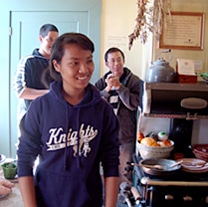 |
|
Grantee: Friends of Peralta Hacienda Historical Park Grant: 2011 Museums for America, Engaging Communities Pictured: Interns recieve docent training in the Peralta kitchens.
|
|
Contact: Holly Alonso
Website: See also: StoryCorps blog post: Everyone Makes History in the Fruitvale
|
“The Peralta Hacienda site is about more than just a historic family that lived in the house from 1820; it’s about the community today and what we can learn about history from one another.”
– Executive Director Holly Alonso
Peralta Hacienda Historical Park is a six-acre community park and museum in the Fruitvale district of Oakland and one of the most significant historical sites in Northern California. The site, replete with outdoorexhibits, special gardens, and built structures—both new and historical—holds the history of the Peralta family, one intertwined with that of the native peoples of the East Bay. The family lived in three dwellings from 1820 through the Spanish, Mexican, and U.S. eras, reflecting the transformations of California. The Peralta House is now a city and state landmark listed on the National Register of Historic Places. A multisensory museum inside tells the story of this family whose experience profiles the history of their times. While the makeup of the area has certainly changed since the construction of the Peralta House in 1870, an IMLS Museums for America grant-funded program helps the local community to recognize the significance of its history.
History as a Transformative Agent
Beyond the goals of driving foot traffic to the historic site and helping to keep alive the history of the once vast Rancho San Antonio, Friends of Peralta Hacienda Historical Park wanted to involve community members directly in the site, inspiring them to discover the historical significance of their families’ journeys. Peralta Hacienda recognizedthat it could provide an opportunity for skills training, employment, and empowerment for residents in the low-income, gang, and street violence-prone neighborhoods of East Oakland. So the group used the IMLS grant to train members of the diverse local community as docents to lead historical tours at the Peralta House using their own stories, and to help the museum engage with the larger public. For cultural groups within Fruitvale that often do not interact at all, this program provided a unique opportunity to connect through shared histories and common ground.
To make a docent program feasible in a low-income community, Peralta House offers a stipend to training participants. StoryCorps records each docent trainee’s story, and then the recordings are catalogued in the Library of Congress. Community participants find links between their own stories and the history of the Peralta rancho, integrate their own stories into their tour presentations, and are encouraged to engage every visitor in dialogue.
Connecting Storytelling, History, and Identity Building
In order to increase awareness and participation, the ability to offer tours in languages other than English was also a priority. To fill linguistic gaps, the museum also developed Spanish and Mien language tours and docent training for the substantial Latino and Laotian Mien communities, and the entire museum is now creating Spanish labels using the IMLS grant. Community members also participated in recording the audio tour in Spanish.
“To make California history comprehensible in visitors’ own languages, to let them feel a part of things and take ownership, is so important,” said Holly Alonso, Peralta Hacienda Historic Park Executive Director. “A Laotian refugee in the docent training program said to me, ‘I never knew Fruitvale had a history. Now I know how important it is.’ Knowing his community’s history strengthened his own sense of identity. People need roots and context to feel connected to the community.”
Peralta Hacienda also encouraged community members to start classes and other enterprises at the site, and ultimately grew successful programs from suggestions. Both evening and afterschool programs teaching history and dance of the Mexica, an indigenous people of the Valley of Mexico, were spearheaded by a community member training to be a docent. These free weekly dance and heritage classes have become a magnet for members from across the community, with over 40 people attending every Monday to make music, dance, and learn about indigenous cultures of Mexico. The site now hosts performance events celebrating Maya culture, initiated by community docents, which run from dawn until dusk. The Cambodian community has also adopted PeraltaHacienda as a place for community events, holding Oakland’s celebration of Cambodian New Year there in early April.
Promoting Community
By involving new community groups as exhibit developers, tour leaders, oral history subjects, entrepreneurs, and audiences, the historic site strengthened its community relevance and expanded the institution’s capacity to serve the public.
During the first year of the docent program, 60 members of the community signed up with the Peralta House; another 60 will participate in the training this year. This expanded corps will help Peralta Hacienda market the many resources available to the public by canvassing churches, schools, and the community to encourage residents to take advantage of youth programs, outdoor space, and rich local history. Since the start of the program, annual attendance at the historic site has tripled and continues to grow.
In addition to attracting more visitors, the historic site created new bonds and trust through this program by imparting valuable training and creating a new dialogue using the community’s own voices. Two community tour leaders have become permanent staff members. Beverly Hodge was hired as Curator of Community Engagement when she finished the training and has gone on to become Associate Director. She brings an actionable approach that is heartfelt, fearless, and totally committed to community problems such as drug-dealing, gangs, juvenile prostitution, and truancy with an appreciation of how these stories can enter the museum, enrich it, and benefit the community.
Many previous docents are also still linked to Peralta Hacienda through community connections. Without exception, all participants learned more about history and became more connected to the community of Fruitvale past and present.